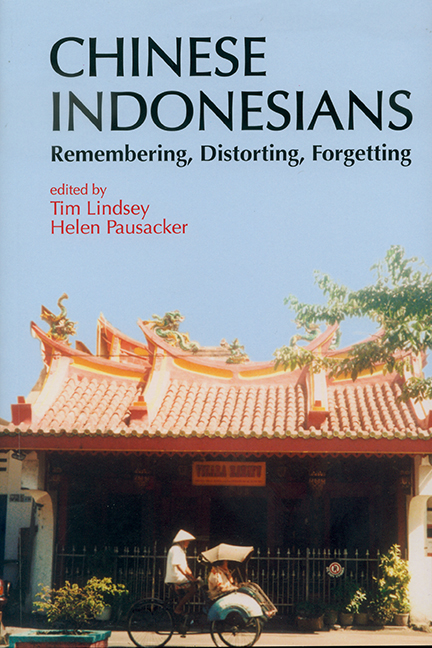Book contents
- Frontmatter
- Contents
- Preface
- A Brief Biography
- Contributors
- Glossary
- Introduction: Researching the Margins
- Bibliography of Charles Coppel's Work
- 1 Anti-Chinese Violence and Transitions in Indonesia: June 1998–October 1999
- 2 Reconstituting the Ethnic Chinese in Post-Soeharto Indonesia: Law, Racial Discrimination, and Reform
- 3 Buddhism and Confucianism in Contemporary Indonesia: Recent Developments
- 4 Portrait of the Chinese in Post-Soeharto Indonesia
- 5 The Makam Juang Mandor Monument: Remembering and Distorting the History of the Chinese of West Kalimantan
- 6 Confucianists and Revolutionaries in Surabaya (c1880–c1906)
- 7 The Chinese and the Early Centuries of Conversion to Islam in Indonesia
- 8 The Agony of Love: A Study of Peranakan Chinese Courtship and Marriage
- 9 Peranakan Chinese and Wayang in Java
- Index
Preface
Published online by Cambridge University Press: 21 October 2015
- Frontmatter
- Contents
- Preface
- A Brief Biography
- Contributors
- Glossary
- Introduction: Researching the Margins
- Bibliography of Charles Coppel's Work
- 1 Anti-Chinese Violence and Transitions in Indonesia: June 1998–October 1999
- 2 Reconstituting the Ethnic Chinese in Post-Soeharto Indonesia: Law, Racial Discrimination, and Reform
- 3 Buddhism and Confucianism in Contemporary Indonesia: Recent Developments
- 4 Portrait of the Chinese in Post-Soeharto Indonesia
- 5 The Makam Juang Mandor Monument: Remembering and Distorting the History of the Chinese of West Kalimantan
- 6 Confucianists and Revolutionaries in Surabaya (c1880–c1906)
- 7 The Chinese and the Early Centuries of Conversion to Islam in Indonesia
- 8 The Agony of Love: A Study of Peranakan Chinese Courtship and Marriage
- 9 Peranakan Chinese and Wayang in Java
- Index
Summary
The pressure on peranakan Chinese themselves to forget and the tendency of others to distort or neglect their role are giving way to a constructive remembering [of] the part which they have played in the development of Indonesian literature as a whole.
(Charles Coppel 1995)This volume honours, and reflects on, the life and work of Charles Coppel, who retired from the University of Melbourne in 2002. Throughout his academic career, Charles researched aspects of Indonesian Chinese, but his interests — as reflected in this volume — were broad, ranging from history, politics, legal issues, and violence against the Chinese to culture and religion.
As students, colleagues, and friends of Charles, the authors of the chapters in this volume have all been influenced by his work and his interest in our research. The chapters in this volume have been chosen both because of the authors' personal links with Charles and because they reflect his own areas of interest within the field.
The chapters also all reflect the theme ‘remembering, distorting, forgetting’, as used in Charles' article ‘Remembering, Distorting, Forgetting: Sino-Malay Literature in Independent Indonesia”. In his work, Charles emphasized this theme to draw attention to misrepresentations of the Chinese, seeking to locate the realities behind the myths which form the basis for the racism and xenophobia they have often experienced in Indonesia. The chapters selected for this Festschrift reflect the same themes.
Jemma Purdey analyses incidents of violence against the Chinese in Indonesia during the reformasi period and in particular the rape of Chinese women in Jakarta in 1998. She queries whether there has been any “improvement” in attitudes towards the Chinese. Can traditions of violence towards the Chinese be forgotten?
Tim Lindsey focuses on changes to the Indonesian legal system post-Soeharto and the effects of these changes on the Indonesian Chinese. Successive governments since the New Order have pointed to reforms they claim have removed formal discrimination. This chapter asks whether this is a distortion of reality and whether New Order discrimination is still legislatively “remembered”.
Leo Suryadinata details the changing role of Confucianism and Chinese Buddhism in the past and reviews changes which have occurred since reformasi.
- Type
- Chapter
- Information
- Chinese IndonesiansRemembering, Distorting, Forgetting, pp. vii - ixPublisher: ISEAS–Yusof Ishak InstitutePrint publication year: 2005



